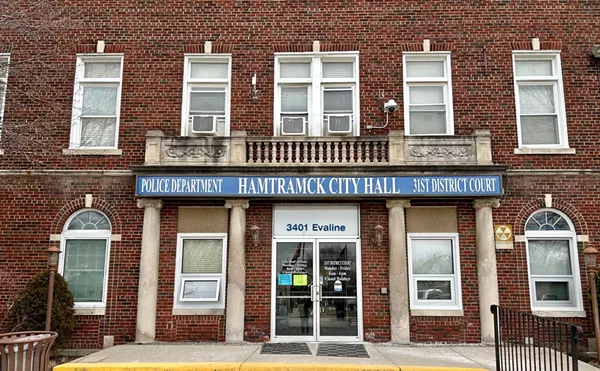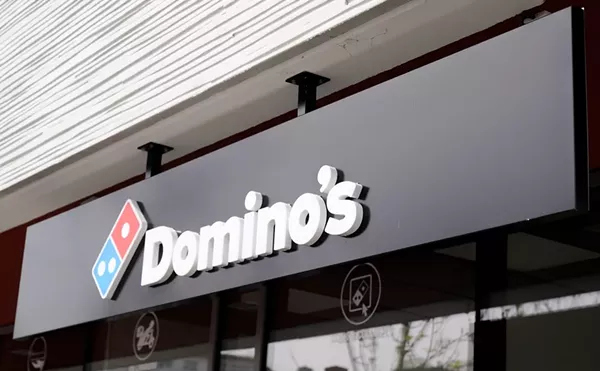
Audio By Carbonatix
[
{
"name": "GPT - Leaderboard - Inline - Content",
"component": "35519556",
"insertPoint": "5th",
"startingPoint": "3",
"requiredCountToDisplay": "3",
"maxInsertions": 100,
"adList": [
{
"adPreset": "LeaderboardInline"
}
]
}
]
Yes, kiddies, this is indeed a national election year! Our deeply respected and devoutly loved major parties are about to begin the grand process of formally choosing presidential candidates, an event which so far, unfortunately, has created slightly less excitement than Melvindale’s annual "think stale!" bake sale.
Largely that’s due to a complex mix of metaphysical factors, such as: 1) The candidates are boring "suits"; 2) Nobody can tell what they stand for and wouldn’t believe their promises if they did; 3) It’s way too early to care.
Indeed, the election does seem a long way off. Were I to get pregnant tonight, for example, I would be a mommy well before Peter Jennings begins smugly announcing the results of the exit polls Nov. 7. Even the national conventions are not till August, and we all have miles of snow to shovel and scores of promises to break before then.
But half the choice is upon us, right now. Chances are that the meaningful presidential primary season, which starts next Monday in Iowa, will last no more than six or seven weeks. Hard to imagine, but back in 1968 Bobby Kennedy didn’t even decide to get into the race until March 16; by the time he was assassinated June 5, he had a real shot at getting enough delegates to win the nomination.
The guys in the back rooms have tried to make sure that can’t happen again. What they do now is "front-load" the process, so by the time most normal, sane humans start paying attention, it is over. Next Monday, in Iowa, people gather in living room "caucuses" to start selecting delegates to each party’s convention. Then the media’s gnat-like attention span shifts to New Hampshire, a state with fewer people than Oakland County, which has the first-in-the-nation presidential primary Feb. 1. Any perceived "winner" in these backwaters gets an enormous bounce in the media, which is why candidates spend so much time and money there.
Things then simmer until Feb. 19, when South Carolina Republicans are supposed to quench any unexpected moderate stirrings. Three days later, on George Washington’s real birthday (Feb. 22), it’s Michigan’s turn. Democrats opted out of the primary, as previously noted here, since the party bosses objected to its democratic and inclusive nature. This state, however, is likely to make or break John McCain.
Two weeks later, the dominos start to fall. The closest thing ever to a national primary comes March 7, when 15 states, including New York and California, have primaries and caucuses that will select more than 2,000 delegates. The next week, Florida, Texas, and other Southern states select hundreds more, and while scattered states and unincorporated areas (New Jersey) will drag the process out till June 6, the shouting is apt to be essentially over before the end of March.
Honk if you missed it. Each race is fast becoming a two-man show. First, the Democrats. Vice President Al Gore, 52 in March, the anointed pseudo-incumbent, is facing a strong challenge from Bill Bradley, 56, the former U.S. senator and basketball player. Neither is what you might call a golden throat, and they have spent much time yammering about their health care plans, the differences in which are as incomprehensible to me as to my favorite truck driver, Nick Rhein. Given the Clinton experience, this may seem about as relevant as arguing about the King of Siam.
But Bradley has, indeed cut into the vice president’s support and some (not all) polls have him ahead in New Hampshire. Besides being inescapably linked to Clinton, and having ethical fundraising problems of his own, Gore has seemed even more wooden than usual, unable to articulate what he might do as prez, apart from no Oval Office blow jobs.
Bradley now is raising money as fast as Gore. Yet the process is against him. Too many local politicians – Michigan is a prime example – have been building ties to the Gore machine for years, and do not want to have to start over. Bradley needs to show that he would have a much better chance of winning in November.
What the old Knick has to do is simple. Do better-than-expected, meaning make it close in Iowa. Then win smashingly in New Hampshire, and get the nation thinking he’s got momentum and Gore is slipping. Then, win not only New York and California, but all the New England states voting March 7, and score a major upset in Ohio. Do less, and party regulars and inertia are virtually certain to install Prince Albert.
Would Bill Bradley be a stronger candidate or a better leader? Both are unclear. He might be less electable; without a Southerner atop the ticket, Democrats tend to get shut out in the kudzu belt; Gore ought to win at least a few Southern states.
Yet he says he would fight to reform what longtime Washington journalist Elizabeth Drew calls "our broke, corrupt campaign finance system." Drew, who wrote for the New Yorker for many years, is no fire-breathing crazy. But in a devastating new book, The Corruption of American Politics (Birch Lane Press), she convincingly argues that we are in trouble. What if people eventually conclude the old firm just can’t be fixed?
I think we owe it one more fresh try, and as of now, I just might show up at the party bosses’ despised caucus March 11, and vote for Bill Bradley.





